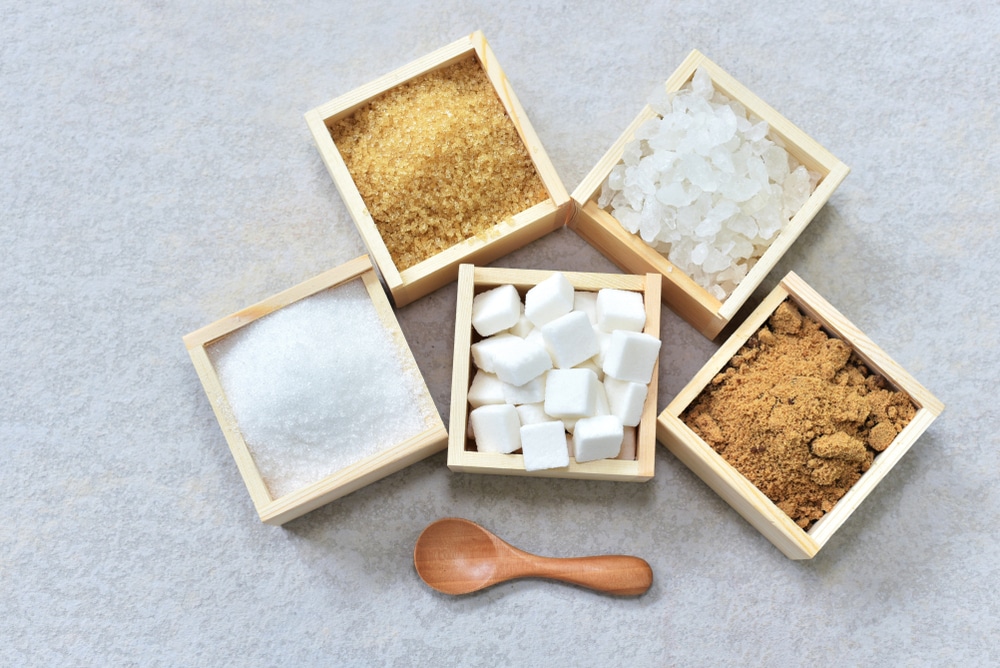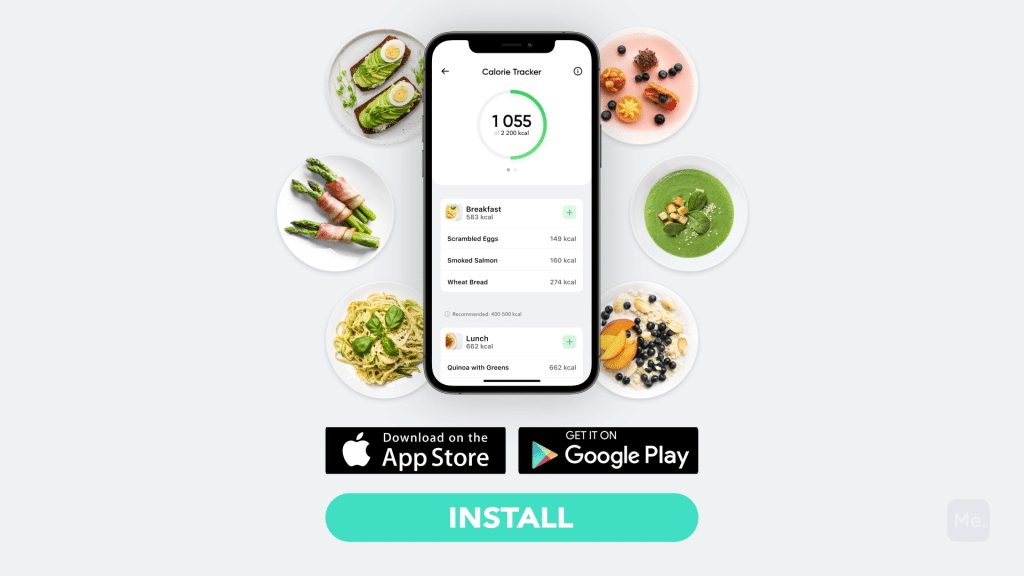How much sugar per day is too much and what amount of it is right for you? When it comes to health and weight loss, many factors can affect the rate and effectiveness of your success. We all know how much diet and exercise matter in this case but have you ever considered how sugar can impact your weight and general health?
Get your personalized
meal plan!

Parts of the scientific community have always been against artificial sweeteners and now, with more and more processed foods hitting the markets, the community of people in the fitness and dietary world are insisting that we must all take a step back from how much sugar we consume per day. So how much sugar per day should you consume? Read on to find out the recommended amount, the health risks of too much sugar, and if natural sugar is any better than artificial added sugars.
What Is Sugar?
According to exploratorium.edu, the white stuff we know as sugar is a carbohydrate made up of 12 atoms of carbon, 22 atoms of hydrogen, and 11 atoms of oxygen.
Newscientist.com further states that while there are many types of sugars, all carbohydrates are made up of three simple sugars known as monosaccharides: glucose, fructose and galactose: all which affect our bodies in one way or another with some being processed differently than others.
Fructose is the more controversial of these types and our intake of it is what concerns many doctors, nutritionists and fitness experts.
How Much Sugar Per Day Is Too Much?
As things stand, most of the world’s population is already consuming more grams of sugar per day than they should. According to the American Heart Association, American adults alone consume 77 more grams of sugar per day than they should and children are even worse off as they tend to consume 81 grams more than they should.
The organization recommends the following:
- Women should limit their added sugar intake to about 6 teaspoons a day which amounts to 25 grams or 100 calories of their total food energy intake.
- As for men, they should consume no more than 9 teaspoons of this sweetener per day – which translates to 36 grams or 150 calories of added sugar a day.
- Children and teenagers (from 2 to 18 years old) should be limited to less than 25 grams or 6 teaspoons of added sugar daily.
Looking for a way to break the vicious cycle of weight loss and tone up all the jiggly parts? Watch the extra pounds fly off and your muscles firm up with the BetterMe app!
How Does A High Daily Sugar Intake Affect You? The Negative Side Effects Of Eating Too Much Sugar
If you are not yet convinced to reduce how much sugar per day you consume, here are some health risks that you could be exposing yourself to:
-
High Blood Pressure
Increased daily sugar intake has long been related to an increase in blood pressure. One 2019 study done in 128 older adults aged between 65 to 80 years old found an association between added sugar intake and blood pressure in women. Analysis of the data predicted that by reducing their daily added sugar intake by just 2.3 teaspoons they would notice an 8.4 mmHg drop in systolic and a 3.7 mmHg drop in diastolic blood pressure (3).
-
Increased Risk Of Fatty Liver Disease
When most people think about fatty liver disease, they often associate it with drinking too much alcohol. While this is often the major cause of this illness, a little known fact to many is that the consumption of too much added sugar also puts you at a risk of this illness.
When you consume more than the recommended grams of sugar per day, it can cause fatty buildup in the liver which then leads to liver disease. One 2015 study revealed that fructose (especially found in high-fructose corn syrup in sodas, energy drinks and more) is one of the main contributors to non alcoholic liver disease (5). A review done in 2018, further confirmed these findings and added that high-sugar diets not only increase the risk of non-alcoholic liver disease (NAFLD), but also non-alcoholic steatohepatitis (NASH) (9).
-
Higher Risk Of Atherosclerosis
According to the Mayoclinic, atherosclerosis is the buildup of plaque – fats, cholesterol and other substances – in and on your artery wall. This buildup causes your arteries to narrow, which blocks blood flow or even blood clots if the plaque bursts. A study in 2011 revealed that diets that are particularly high in simple carbohydrates and fructose are more likely to contribute to this illness (11).
-
Increased Risk Of Heart Disease And Stroke
In 2013, one study named heart disease as the number one cause of deaths worldwide (8) and to date the World Health Organization, states that this fact remains the same with stroke coming in second on the list (16).
All the illnesses mentioned above – high blood pressure, atherosclerosis, and fatty liver disease contribute to the development and worsening of heart disease in patients. Reducing how many grams of sugar per day you consume can go a long way in reducing your risk of heart disease. One study review done in 2014 revealed that those who consumed 17 percent to 21 percent of calories from added sugar had a 38 percent greater risk of dying from heart disease, as compared to those who limited their added sugar intake to 8 percent of total calories (2).
Read More: What Does Sugar Do To Your Body? 16 Reasons Why Too Much Added Sugar Is Bad For You
-
Mental Disorders And Depression
In 2017, a study looking at the adverse effect of sugar intake from sweet food/beverage on long-term psychological health confirmed that increased sugar intake was associated with common mental disorders and depression. The study saw that men who ate the highest amount of sugars had a 23 percent higher chance of common mental disorders than those who consumed lesser amounts (14).
-
Increased Appetite, Weight Gain, And Obesity
Fructose is a main component of added sugar and it is one thing that causes a lot of problems.
When it comes to increasing your appetite, isolated fructose is said to increase levels of the hunger-promoting hormone ghrelin while decreasing levels of the appetite-suppressing hormone leptin (7). It is also said to affect the hypothalamus part of the brain which is responsible for many functions, including appetite regulation, calories burned, as well as carb and fat metabolism (4).
In 2013 a review showed that consumption of sugar-sweetened beverages promotes weight gain in adults and children (15). A 2018 review also showed that excessive sugar r also impacts your brain and hormones making you crave for sweet-tasting foods which leads to weight gain and obesity (10).
-
Tooth Decay
The acid created by bacteria in your mouth after they digest sugar erodes your teeth and is what leads to tooth decay and cavities
-
Acne
Several studies have consistently demonstrated the correlation of increased added sugar intake to acne.
2012 – A study done in Turkey of about 2,300 teens aged 13 to 18 years old showed that the teens whose diets were higher in sugar had a 30 percent higher risk in developing acne. These children suffered from acne in moderate to severe levels (1).
2016 – Diets that are higher in sugar quickly increase blood sugar and insulin levels, causing increased androgen secretion, oil production and inflammation, all of which play a role in acne development (13).
2019 – A study done on over 8,000 Chinese adolescents showed that the teens who consumed more soft drinks were diagnosed with more skin diseases by certified dermatologists and were more likely to develop moderate-to-severe acne (6).
To prevent all this, you must always take caution to stick to the recommendations of the amount of how much sugar per day is healthy for you.
How Much Natural Sugar Per Day Is Healthy?
In place of added sugar, natural sugar is considered to be a much better, more healthier option to have. According to the Cancer Treatment Centers of America blog, natural sugars are those that are found naturally in fruit and milk as fructose and lactose, respectively.
So how much natural fruit sugar per day is healthy for you? The simple answer is that there is no limit to how much natural sugar you can consume in a day. As long as the sugar you are consuming comes from fruits, vegetables, and/or milk, there is no cap on how much natural sugar intake per day. This type of sugar simply doesn’t have the same detrimental effects on your health or weight, and the foods that contain them are nutritious and healthy.
If you tend to let yourself off the hook, raise the white flag when things get tougher than you expected, send yourself on an unconscious binge-eating trip – BetterMe app is here to help you leave all of these sabotaging habits in the past!
How Much Natural Sugar Per Day To Lose Weight?
As stated above, there is no limit to how much fruit/natural sugar you can consume in a day, a fact that does not change with regards to how much you weigh. If you are looking to lose weight, eating fruit – even the very sweet fruits like mangoes, pineapples, watermelon, etc. – will not hinder your efforts.
In fact, this might end up helping your efforts due to the fiber found in fruit and vegetables which helps keep you fuller for longer thus reducing how many calories you consume per day. According to a 2018 study, fruit fiber has many more potential health benefits which include (17):
- Protecting colonic gastrointestinal health – You are less likely to suffer from constipation, irritable bowel syndrome, inflammatory bowel diseases, and diverticular disease.
- Reducing the risk of chronic illnesses such as cardiovascular disease, type 2 diabetes and metabolic syndrome.
- Defending against colorectal and lung cancers.
- Reducing the severity of asthma and chronic obstructive pulmonary disease.
- Enhancing psychological well-being and lowering the risk of depression.
- Reducing the risk of seborrheic dermatitis.
- Contributing to higher bone mineral density in children and adults.
- Overall improving odds of successful aging.
As this study suggests there is no harm in eating fruit (aka natural sugar) when trying to lose weight.
Read More: Healthy Alternative To Sugar In Coffee: Enjoy Your Cup Of Joe The Healthy Way!
How Much Natural Sugar To Eat If Working Out?
How much natural sugar is it okay to eat per day is working out for weight loss? Just because added sugar is bad for health and weight loss does not mean that we can demonize natural sugar as well. The inherent fear of sugar that most people have comes from ill-informed sources about fructose in fruit as well as some weight loss diets that call for the elimination of all if not almost all types of fruit.
But as previously stated, natural sugar is not the enemy and you can eat as much fruit, vegetables, and dairy as fit into your daily energy needs while working out and as part of your healthy diet for weight loss. The paradox of fruit sugar and obesity was discussed in some research published online in 2016.
The study explained that while fruits do indeed contain large amounts of simple sugars such as glucose, fructose, sucrose, etc. which are very well known to cause obesity, their consumption does not contribute to obesity but rather it leads to weight reduction.
Fruits with their natural sugars have ‘anti-obesity effects such as promoting prolonged satiety, decreasing total calorie intake, and helps modulate the guts’ ecology, all facts that help with weight loss (12).
How Much Sugar Per Day Added Vs. Natural?
While there is no limit on how much natural sugar one can consume in a day, the daily limit to added sugar is 25 grams in women, 36 grams in men, and less than 25 grams in children aged 2 to 18 years old.
How Much Natural Sugar Per Day For A Woman?
There is no limit to how much of this she can consume, whether she is actively trying to lose weight or not.
The Bottom Line
When it comes to how much sugar per day one should consume, science is very clear that the less added sugar that you have in your diet, the happier and healthier you will be. Added sugars, while they might taste good, cause more harm than good. Instead of them, you are encouraged to replace them with foods that contain natural sugars such as fruit, which not only do not have a daily limit, but are also very good for your health.
DISCLAIMER:
This article is intended for general informational purposes only and does not address individual circumstances. It is not a substitute for professional advice or help and should not be relied on to make decisions of any kind. A licensed physician should be consulted for diagnosis and treatment of any medical conditions. Any action you take upon the information presented in this article is strictly at your own risk and responsibility!
SOURCES:
- Acne: prevalence and relationship with dietary habits in Eskisehir, Turkey (2012, pubmed.ncbi.nlm.nih.gov)
- Added sugar intake and cardiovascular diseases mortality among US adults (2014, pubmed.ncbi.nlm.nih.gov)
- Added Sugar Intake is Associated with Blood Pressure in Older Females (2019, ncbi.nlm.nih.gov)
- Brain regulation of appetite and satiety (2009, ncbi.nlm.nih.gov)
- Carbohydrate intake and nonalcoholic fatty liver disease: fructose as a weapon of mass destruction (2015, ncbi.nlm.nih.gov)
- Daily Intake of Soft Drinks and Moderate-to-Severe Acne Vulgaris in Chinese Adolescents (2019, jpeds.com)
- Effects of High-Fructose Diets on Central Appetite Signaling and Cognitive Function (2015, ncbi.nlm.nih.gov)
- Estimating Deaths From Cardiovascular Disease: A Review of Global Methodologies of Mortality Measurement (2013, ncbi.nlm.nih.gov)
- Fructose and sugar: A major mediator of non-alcoholic fatty liver disease (2018, pubmed.ncbi.nlm.nih.gov)
- Impact of sugar on the body, brain, and behavior (2018, pubmed.ncbi.nlm.nih.gov)
- Is the metabolic syndrome caused by a high fructose, and relatively low fat, low cholesterol diet? (2011, pubmed.ncbi.nlm.nih.gov)
- Paradoxical Effects of Fruit on Obesity (2016, ncbi.nlm.nih.gov)
- Significance of diet in treated and untreated acne vulgaris (2016, ncbi.nlm.nih.gov)
- Sugar intake from sweet food and beverages, common mental disorder and depression: prospective findings from the Whitehall II study (2017, nature.com)
- Sugar-sweetened beverages and weight gain in children and adults: a systematic review and meta-analysis (2013, academic.oup.com)
- The top 10 causes of death (2020, who.int)
- Whole Fruits and Fruit Fiber Emerging Health Effects (2018, ncbi.nlm.nih.gov)














